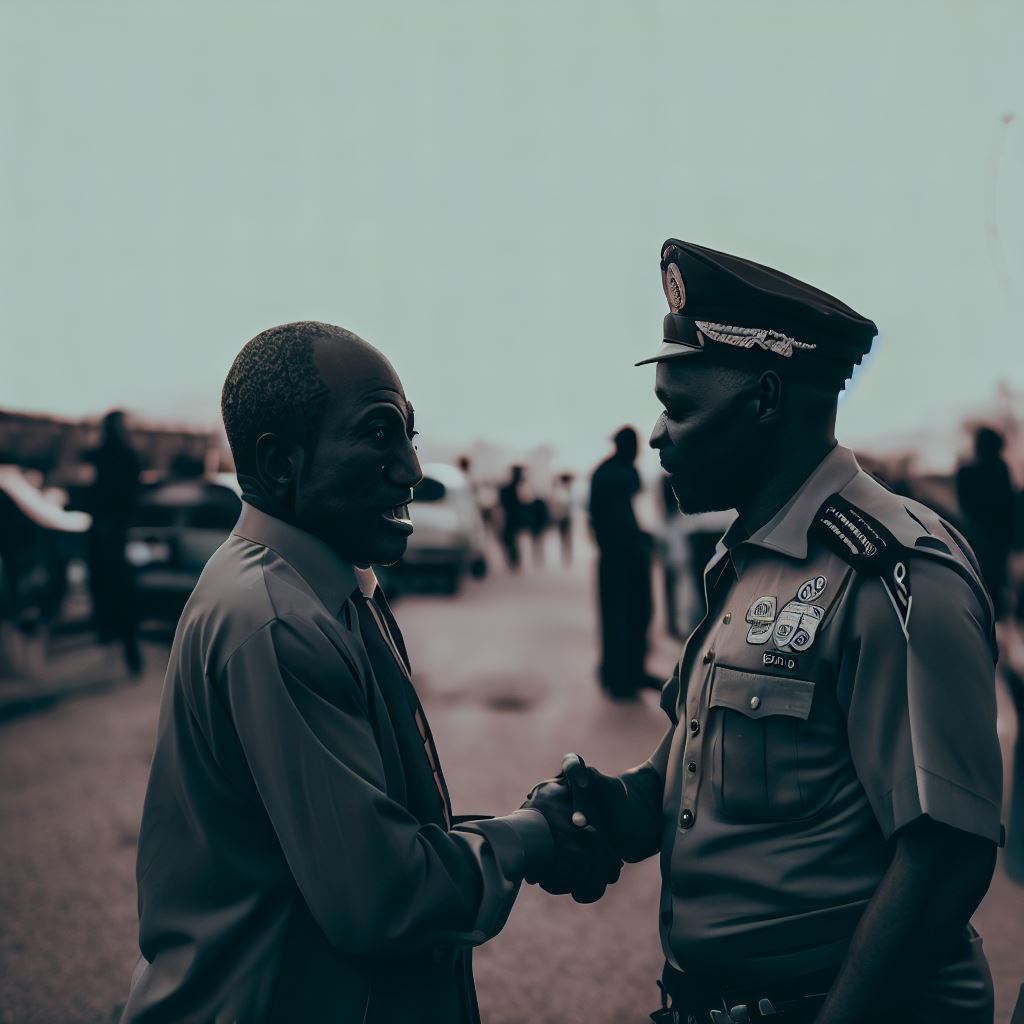The Relationship between the Police and the Public in Nigeria
Last Updated on September 15, 2023
Introduction
A. Overview of Police-Public Relationship
The relationship between the police and the public in Nigeria is complex, marked by challenges and opportunities.
B. Importance of a Healthy Relationship
A positive police-public relationship is vital for security, trust, and social harmony.
It enhances crime prevention and community cooperation.
C. Aim of the Blog Post
This blog post aims to dissect the current state of this relationship in Nigeria, highlighting its challenges and offering potential solutions to bridge the gap.
Historical Context of Policing in Nigeria
A. Brief history of the Nigerian police force
The Nigerian Police Force, established in 1820, has a rich history that dates back to the colonial era.
During this period, the primary objective of the police force was to maintain law and order in British-controlled Nigeria.
Initially, the force was made up of indigenous officers who underwent training in the United Kingdom under the colonial administration’s supervision.
The Nigerian police force continued to operate under British control until Nigeria gained independence in 1960.
B. Evolution and development of the relationship with the public
Following Nigeria’s independence, the police force underwent significant changes, aiming to establish a stronger connection with the public.
During the early years of independence, the police force faced numerous challenges such as corruption, inadequate training, and insufficient resources.
These issues strained the relationship between the police and the public, leading to a lack of trust and cooperation.
As a result, the police force embarked on a journey to reform and rebuild its relationship with the Nigerian people.
In the 1970s, efforts were made to restructure and modernize the police force.
Training institutions were established within Nigeria to enhance the professionalism and competence of officers.
Additionally, community policing initiatives were introduced to encourage collaboration between the police and the public.
The objective was to establish a mutually beneficial relationship based on trust, respect, and shared responsibility.
However, despite these efforts, the relationship between the police and the public in Nigeria has remained strained.
Instances of police brutality, corruption, and abuse of power have continuously marred this relationship.
Many Nigerians view the police force as untrustworthy and inefficient in carrying out its duties.
Over the years, public outcry against police misconduct has grown stronger, highlighted by widespread protests such as the #EndSARS movement in 2020.
This movement aimed to address the pervasive issues within the Nigerian Police Force and called for comprehensive reform.
The protests demonstrated the deep-rooted discontent Nigerians have with the police and their desire for change.
Moving forward, it is crucial for the Nigerian government to prioritize police reform and address the systemic issues within the force.
Read: The Impact of Traditional Policing in Nigerian Communities
Factors Influencing the Relationship
The relationship between the police and the public in Nigeria is influenced by several key factors.
These factors contribute to the level of trust, confidence, and cooperation between law enforcement agencies and the Nigerian population.
A. Lack of trust and confidence in the police force
One of the primary factors that affect the relationship between the police and the public in Nigeria is the lack of trust and confidence in the police force.
This lack of trust can be attributed to factors such as corruption and bribery. Corruption within the police force undermines public trust and diminishes confidence in law enforcement.
Similarly, the abuse of power and human rights violations by some police officers further erode trust in the institution.
B. Inadequate police training and professionalism
Another factor that influences the relationship between the police and the public is the inadequate training and professionalism within the police force.
Insufficient training can lead to misconduct, abuse of power, and a lack of proper understanding of community policing principles.
This hampers effective interactions between the police and the public, negatively impacting their relationship.
C. Insufficient resources and infrastructure
The lack of necessary resources and infrastructure is a significant challenge for the police force in Nigeria.
Inadequate funding limits the ability of law enforcement agencies to effectively serve the public.
Limited resources result in a lack of equipment, vehicles, and other essential tools required for effective policing.
This can lead to frustration among the public and strain the relationship between the police and the citizens they are meant to protect.
D. Socioeconomic disparities and inequality
Socioeconomic disparities and inequality also influence the relationship between the police and the public in Nigeria.
High levels of poverty, unemployment, and inequality create a breeding ground for mistrust and criminal activities.
The police force is often seen as being biased or favoring certain segments of society.
This perception further deepens the divide between law enforcement and the public, making it difficult to establish a mutually trusting relationship.
The relationship between the police and the public in Nigeria is influenced by various factors, including the lack of trust and confidence in the police force, inadequate training and professionalism, insufficient resources and infrastructure, and socioeconomic disparities.
Addressing these factors is crucial for improving the relationship and fostering a safer and more secure society in Nigeria.
Read: Working Conditions of Police Officers in Nigeria: A Study
Consequences of a Deteriorated Relationship
A deteriorated relationship between the police and the public in Nigeria can have severe consequences, affecting various aspects of society.
A. Increased crime rates and insecurity
When the relationship between the police and the public deteriorates, there is a higher likelihood of increased crime rates and insecurity.
The lack of trust and cooperation between the police and the public can hamper crime prevention efforts.
Police may become demoralized and less inclined to perform their duties effectively, leading to a rise in criminal activities.
B. Vigilante justice and mob action
In the absence of trust in the police, communities may resort to vigilante justice and mob action.
Individuals may take the law into their own hands, leading to incidents of violence and even unlawful killings.
This further erodes the rule of law and creates an atmosphere of fear and insecurity within the society.
C. Loss of public faith in the justice system
A deteriorated relationship between the police and the public can result in the loss of public faith in the justice system.
When individuals perceive the police to be biased or corrupt, they might question the legitimacy of the entire justice system.
This loss of faith in the system undermines its ability to enforce the law and maintain social order.
D. Social unrest and protests
A deteriorated relationship between the police and the public often leads to social unrest and protests.
Public discontent and frustration at the perceived injustice can boil over into widespread demonstrations and civil unrest.
These protests can disrupt public life, harm the economy, and even escalate into violent clashes between protesters and security forces.
Overall, a deteriorated relationship between the police and the public in Nigeria has far-reaching consequences.
It leads to increased crime rates and insecurity, promotes vigilante justice and mob action, erodes public faith in the justice system, and sparks social unrest and protests.
We must actively rebuild trust, improve police accountability, and promote collaborative public safety and security efforts.
Only by addressing these consequences can Nigeria hope to create a safer and more just society for all its citizens.
Read: Police Accountability and Human Rights in Nigeria
Efforts to Improve the Relationship
Improving the relationship between the police and the public in Nigeria is a crucial task that requires persistent efforts.
Several initiatives have been implemented to create positive changes in this relationship.
A. Police reform initiatives
One major step taken is the introduction of community-oriented policing. By adopting this approach, the police force aims to build stronger ties with the community it serves.
The focus shifts from reactive policing to proactive engagement with the public.
Police officers become more accessible to civilians, interact with residents, and work collaboratively to address local issues.
The police force has bolstered internal accountability, actively holding officers responsible for their actions and addressing misconduct effectively.
By promoting transparency and fairness, trust between the police and the public can be restored.
B. Collaborative efforts between the police and the public
Collaborative efforts between the police and the public play a significant role in improving their relationship.
Community engagement programs are vital in creating platforms for dialogue between the police and residents.
By involving the public in decision-making processes, law enforcement agencies can better understand the needs of the communities they serve and work towards fulfilling them.
Public awareness campaigns are also important to bridge the gap and foster understanding.
When citizens are educated about their rights and responsibilities, they can actively contribute to maintaining law and order.
These campaigns aim to promote mutual respect and cooperation between the police and the public, ultimately enhancing the relationship.
C. Use of technology for transparency and accountability
Moreover, the use of technology has proven effective in promoting transparency and accountability.
Various tools such as body cameras, dashcams, and CCTV surveillance systems help capture incidents accurately.
This evidence can be reviewed, ensuring that actions taken by both the police and the public are justifiable.
Technology also enables the sharing of information in real-time, empowering communities and fostering trust in the police force.
Efforts to improve the relationship between the police and the public in Nigeria are multi-faceted.
Police reform initiatives, including community-oriented policing and strengthening internal accountability, are essential for building trust.
Collaborative efforts between the police and the public through community engagement programs and awareness campaigns further strengthen this bond.
Additionally, technology plays a crucial role in promoting transparency and accountability.
Continuous effort can establish a harmonious, cooperative relationship, making Nigeria safer and more secure for everyone.
Read: Becoming a Police Officer in Nigeria: Qualifications Needed

Case Studies or Examples
A. Successful instances of improving police-public relationships in Nigeria
- In Lagos, community policing initiatives have led to increased trust and cooperation between residents and the police.
- The “Eagles Eye” mobile application allows citizens in Kano to report crimes directly to the police, promoting transparency and accountability.
- The “Citizens’ Mediation Centre” in Lagos provides a platform for resolving disputes between the police and the public, improving relationships.
- The “Police Public Relations Committee” in Anambra State organizes dialogues and town hall meetings to foster understanding and cooperation between the police and the public.
- The “Neighbourhood Safety Corps” in Ogun State has employed community members as auxiliary police officers, enhancing trust and collaboration.
B. Analyze the strategies, methodologies, and outcomes of these initiatives
- Community policing initiatives involve officers engaging with local communities, listening to their concerns, and collaborating on problem-solving, resulting in enhanced trust and crime reduction.
- The “Eagles Eye” mobile application allows citizens to report crimes anonymously, leading to improved intelligence gathering and quicker response from the police.
- The “Citizens’ Mediation Centre” provides an alternative to formal legal processes, allowing for faster resolution of conflicts and reducing animosity between the police and the public.
- The “Police Public Relations Committee” establishes a platform for open communication, enabling the exchange of ideas, grievances, and solutions, resulting in improved relations and effective policing.
- The employment of community members as auxiliary police officers through the “Neighbourhood Safety Corps” promotes a sense of ownership, responsibility, and community involvement, leading to better cooperation with the police.
Challenges and Roadblocks
A. Resistance to change within the police force
- The existing police structures and culture hinder effective reforms.
- Many police officers resist new approaches and are resistant to accountability.
- Corruption and unethical practices persist within the police force.
- Older officers may be unwilling to adapt to new policing strategies and technologies.
B. Lack of political will and government support
- Politicians often prioritize their own interests over improving the police-public relationship.
- Government officials may not allocate sufficient funding for police training and equipment.
- Political interference often hampers the independence of the police force.
- Political rivalries and power struggles undermine the effectiveness of policing efforts.
C. Deep-rooted cultural and systemic issues
- Historical authoritarianism and abuse of power have eroded public trust.
- Prejudices and biases within society are reflected in policing practices.
- Traditional hierarchical structures within the police force inhibit open communication and collaboration.
- The general mistrust of the public towards the police perpetuates a cycle of hostility.
D. Limited funding and resources
- The police force faces significant resource constraints, affecting their ability to serve the public.
- Inadequate funding leads to insufficient training, outdated equipment, and lack of manpower.
- Insufficient resources prevent effective community policing and engagement initiatives.
- The lack of proper infrastructure hampers crime prevention and response efforts.
In order to improve the relationship between the police and the public in Nigeria, it is crucial to address these challenges and roadblocks.
Reforms should focus on:
- Overcoming resistance to change by implementing comprehensive training programs and raising awareness about the importance of accountability.
- Creating a conducive environment for police reforms by ensuring political will and government support, including appropriate funding and resource allocation.
- Addressing deep-rooted cultural and systemic issues through diversity and sensitivity training for police officers, as well as fostering community-oriented policing approaches.
- Prioritizing adequate funding and resources for the police force to enhance their capacity and effectiveness in serving the public.
By confronting these challenges head-on, Nigeria can foster a more positive relationship between the police and the public, leading to improved safety, trust, and justice for all.
Recommendations for a Stronger Relationship
A. Strengthening police accountability mechanisms
- Implement independent oversight bodies to ensure accountability within the police force.
- Establish a transparent complaint procedure where the public can report misconduct or abuse.
- Create an internal affairs division responsible for investigating officers’ actions and ensuring discipline.
- Reinforce disciplinary actions against officers involved in corruption or human rights violations.
- Publish annual reports on police misconduct, highlighting actions taken against offenders.
B. Enhancing recruitment and training programs
- Revamp the recruitment process to attract qualified individuals with integrity and empathy.
- Implement comprehensive background checks and psychological assessments for potential recruits.
- Develop standardized and rigorous training programs that emphasize professionalism and human rights.
- Incorporate community policing modules that promote cooperation and understanding.
- Provide ongoing training and professional development opportunities for all officers.
C. Encouraging community involvement and trust-building activities
- Establish community outreach programs to bridge the gap between the police and the public.
- Organize town hall meetings and public forums to facilitate open dialogue and exchange of ideas.
- Promote police participation in local events and engage with community leaders and organizations.
- Create neighborhood watch programs to encourage collaboration between the police and residents.
- Develop community-based crime prevention initiatives to foster trust and cooperation.
D. Improving socioeconomic conditions and addressing systemic issues
- Invest in improving living conditions and infrastructure in economically disadvantaged areas.
- Address corruption within government agencies to restore public trust in institutions.
- Promote equal access to justice and ensure fair treatment regardless of socioeconomic status.
- Collaborate with other sectors to tackle underlying issues like unemployment and poverty.
- Support initiatives that promote social inclusion and reduce discrimination in society.
By implementing these recommendations, Nigeria can pave the way for a stronger relationship between the police and the public.
Strengthening police accountability mechanisms will ensure transparency and trust. Enhancing recruitment and training programs will result in a more professional and empathetic police force.
Encouraging community involvement and trust-building activities will bridge the gap and foster cooperation.
Lastly, improving socioeconomic conditions and addressing systemic issues will create a more just and inclusive society.
It is through these collective efforts that Nigeria can achieve a harmonious relationship between its police and the public.
Conclusion
We have discussed the main points regarding the relationship between the police and the public in Nigeria.
It is crucial to reinforce the importance of a strong police-public relationship for a safer and more prosperous society.
Let us encourage collective efforts from both the police and the public to build trust, promote fairness, and ensure justice in our communities.
Together, we can create a safer and more just society.


